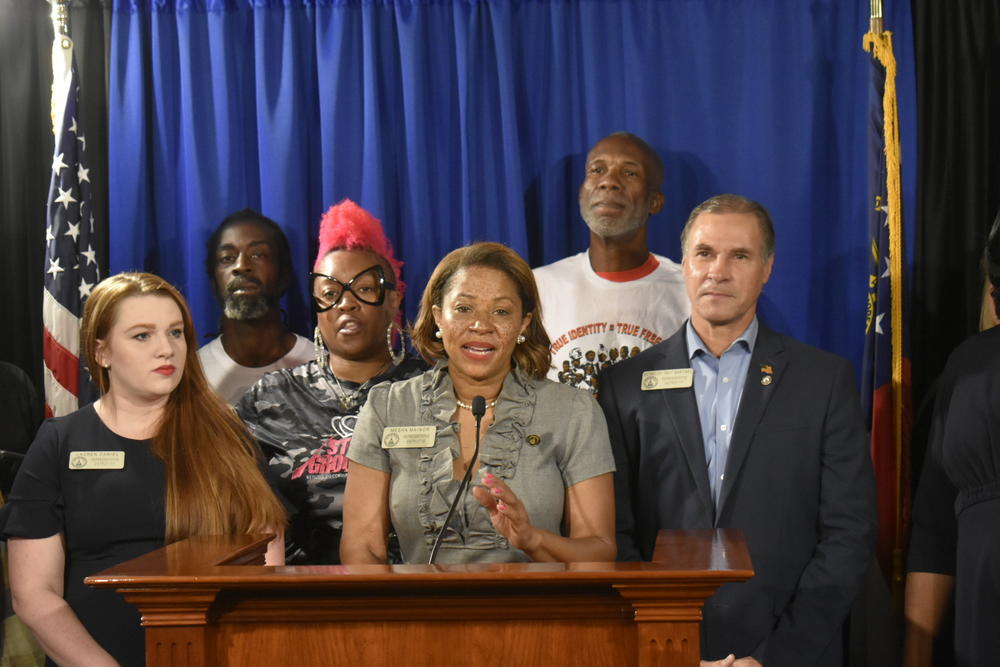
Caption
State Rep. Mesha Mainor calls for her Democratic colleagues to support school vouchers.
Credit: Ross Williams / Georgia Recorder

State Rep. Mesha Mainor calls for her Democratic colleagues to support school vouchers.
Democrats savored a rare win under the Gold Dome in March when, with the help of a handful of Republicans, they fended off a plan to expand Georgia’s school voucher program.
But Atlanta state Rep. Mesha Mainor, the sole Democratic pro-voucher vote, has not been celebrating.
Flanked by Republican state Reps. Reynaldo “Rey” Martinez of Loganville and Lauren Daniel of Locust Grove Thursday, Mainor pledged to keep pushing the controversial plan when lawmakers reconvene in January.
“School choice, if people have the nerve to actually stand up and do what their constituents want, very well could pass in this next legislative session,” she said.
Cumming Republican Greg Dolezal’s Senate Bill 233, which could be revived next session, would send $6,500 to families of children in the bottom 25% of Georgia schools to pull them out and educate them at home or in private schools.
Proponents say that matches the average amount the state pays for a child’s education, and the school a child departs from would still receive federal and local dollars, which they argue results in a net gain. Opponents say it’s not so simple to recover a $6,500 loss by eliminating one student’s worth of teacher pay or school bus gasoline from the budget.
“I agree with those parents who demand an excellent education for their children and are not receiving it today,” said Stephen Owens, education director for the Georgia Budget and Policy Institute. “However, siphoning public funds to private schools that have shown to perform worse, on average, than their public school counterparts is not the answer.”
“Instead of propping up failing private schools, Georgia lawmakers should work to provide schools the resources to meet the needs of every child,” he added. “Georgia remains one of only six states without any additional funding to educate students in poverty, and only provides schools enough funding for one school counselor for every 450 students. We need policymakers to fulfill the constitutional responsibility of public education for all children, not just those who elect to attend discriminatory private schools.”
Democrats say they see vouchers as a way to funnel money from institutions that are accountable to voters and must meet government standards for things like testing and nondiscrimination to private schools, which are not held to the same standards.
Mainor has ruffled her party’s feathers before, and some Democrats viewed her voucher vote as just the latest betrayal. Sandy Springs Democratic Sen. Josh McLaurin publicly offered a $1,000 campaign donation to a potential primary opponent.
Though he did not mention McLaurin by name Thursday, Martinez suggested the senator’s criticism was out of line.
“I wonder if this senator has kids that are going to underperforming schools,” Martinez said. “I don’t know. I can’t answer that. But I am going to tell you something about the senator that I found out. He’s done pretty good for himself. I heard he’s an attorney. I heard that he went to Yale Law School. Well, good for him. Good for him. I’m proud of him. Congratulations. I’m sure his parents are very proud of him. But you know what? Not everybody has that opportunity.”
McLaurin dismissed Martinez’s criticism.
“Instead of attending press conferences with the one Democrat who voted for SB 233, Rep. Martinez should probably spend his time courting the fifteen Republicans — including nine committee chairmen — who voted against it,” he said in a text.
The Republican defectors, mostly from rural areas of the state, faced major pressure to vote against the vouchers from their local school districts. Since the session ended, they have been mostly silent on the issue, but Mainor has continued to irk Democratic leadership by castigating her party on cable news and conservative TV shows.
“Every time I’m on any outlet, even today, I am giving a voice to the 60,000 people I represent,” she said. “I’m giving a voice to the 5,700 people that decided they were going to use school choice options last year. I’m just giving them a voice because otherwise they don’t have a voice. And if we were to go on without even speaking about it, you would think that people don’t support it. Communities support it, parents support it.”
LaQuana “LA PINK” Alexander said she’s among the bill’s supporters. Alexander is president of Street Groomers, a volunteer community group, and her work includes mentoring students at a metro Atlanta school she described as “failing.”
“The children that I mentor in the area can’t read, and they’re not able to go to another school,” she said. “One of my mentees that is doing very well, she wants to go to another school because the school is failing, but she’s not able to go to another school because of the district that she lives in.“
“These children should have a choice, and stripping them of their choice is like telling them that you do not want them to succeed, and that’s not fair.”
Alexander said she came to support vouchers after seeing the students struggle to learn in their local school, and that many parents have told her they also support the idea.
Chris Daniel, a father of two who works for the AFL-CIO labor union, told Mainor he has worked at an Atlanta middle school, and he doesn’t think vouchers would solve anything.
“The solution wasn’t stripping that money away from the school. The solution was more based in that school and in that community,” he said. “So I think that’s where we start. It’s not plucking those dollars away from the school and sending them away. Let’s lean into those schools.”
This story comes to GPB through a reporting partnership with Georgia Recorder.